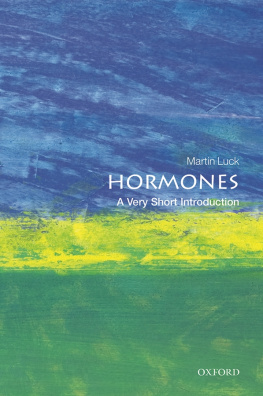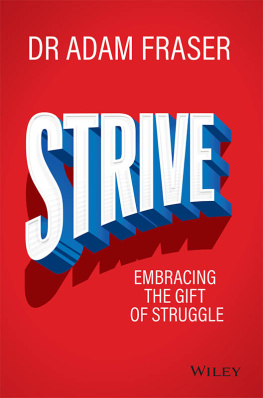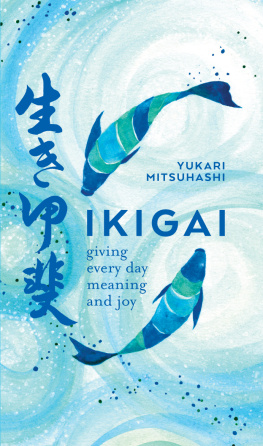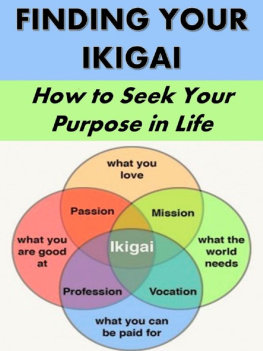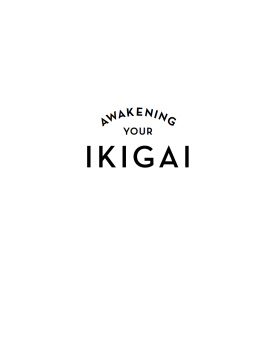Michael Luck
Ikigai
The Japanese Art for Finding Happiness and the Meaning of Life
Copyright 2020 publishing.
All rights reserved.
Author: Michael Luck
No part of this publication may be reproduced, distributed or transmitted in any form or by any means, including photocopying recording or other electronic or mechanical methods or by any information storage and retrieval system without the prior written permission of the publisher, except in the case of brief quotation embodies in critical reviews and certain other non-commercial uses permitted by copyright law.
Table of Contents
What Is Ikigai
In Japan, a large number of people have ikigai (articulated Ick-EE-guy) - motivation to jump every morning.
What is your explanation behind getting up towards the beginning of the day?
The Japanese island of Okinawa, where ikigai has its causes, should be home to the largest population of centenarians on the planet.
Could ikigai's idea increase shelf life?
Dan Buettner, creator of Blue Zones: Lessons on how to live longer from people who have lived longer, is confident to do so.
As Buettner pointed out, the idea of ikigai is not elitist for the inhabitants of Okinawa: "there probably will not yet be a word for it in each of the four blue zones, for example, Sardinia and the Nicoya Peninsula, there is a similar idea among individuals who lead a long life."
Buettner proposes to make three records: his qualities, the things he likes to do and the things that are acceptable. The cross-segment of the three registers is their ikigai.
Studies show that loss of motivation can have an awkward impact.
American mythologist and creator Joseph Campbell said, "My general recipe for my substitutes is to" follow his euphoria. "Find where he is, and don't hesitate to track him down."
"Your ikigai is at the crossroads of what you are acceptable and what you like to do," says Hector Garcia, the co-creator of Ikigai: The Japanese secret of a long and happy life. He writes: "Just as people have been greedy for objects and money since the beginning of time, many people have felt disappointed by the persistent search for money and consents and have focused on an option that could be greater than their material wealth. This has been portrayed in the long run using various words and practices, but continually pointing to the focal center of seriousness throughout everyday life."
Ikigai is considered a combination of four essential components:
What you like (From Your Enthusiasm)
What the world needs (your main goal)
What are you acceptable (your job)
Why can you get paid (your call)
Finding your ikigai is said to bring satisfaction, happiness and make you live longer.
Need to discover your ikigai? Ask for the four accompanying requests:
1. What I like?
2. How am I eligible?
3. What could I get paid right now, or something that could change in my future hustle and bustle?
4. What the world needs?
In his book Ikigai the Japanese secret of a long and happy life, Hector Garcia and Francesc Miralles break the ten guidelines that can help anyone find their ikigai.
1. Stay dynamic and don't give up
2. Give up seriousness and adopt a slower pace of life
3. Just eat until it is 80 percent full
4. Surround yourself with old friends
5. Get fit like a violin through the day to day, gentle exercise
6. Smile and recognize the people around you
7. Reconnecting with nature
8. Express your gratitude to everything that illuminates our day and makes us feel alive.
9. Living in this moment
10. Follow your ikigai
What interests you deeply can open your ikigai to follow your interest.
Pioneer of rationalist and social freedoms, Howard W Thurman said:"Don't ask what the world needs. Ask what makes you wake up and go do it. For what the world needs are the individuals who have woken up."
The problem for many people is that they cease to be interested in new encounters, that they expect responsibilities and schedules.
Their sense of the miracle begins to turn away from them.
However, you can change that, especially if you are still looking for importance and satisfaction in what you do day by day.
Albert Einstein urges us to pursue our interests. Once indicated:
"Try not to consider why you are wondering; in practice, be sure to try. Try not to emphasize what you cannot answer, and do not try to clarify what you cannot know. Interest is your explanation. Is it true that it does not surprise you when you consider the riddles of Infinity, life, the sublime structure behind the real world? In addition, this is the wonder of the human psychethe use of its developments, ideas and recipes as devices to clarify what man sees, hears and contacts. Try to find a little more every day. They have a blessed interest."
A great model is Steve Jobs ' interest in typography, which led him to attend a seemingly useless typography course and build his structural reasonableness.
Later, this reasonableness became a core element of Apples PCs and Apple's differentiation Center in the market.
We are brought into the curious world. Our voracious desire to learn, invent, research and study have the right to have a status similar to each other in our life.
Satisfaction quickly becomes the main need for most of us. A large number of individuals, despite all the battle to understand what they are meant to do. What makes them out. What time understands. Who brings the best of them.
"Our instinct and interest are extremely innovative internal compasses to help us associate with our ikigai" writes Hector Garcia and Francesc Miralles.
What is the only simple thing you could do or be today would it be a statement from your ikigai?
Find out and look for it with everything you have, no less not worth your limited time on planet Earth.
What's Your Goal Behind Being?
As the Japanese point out, everyone has an ikigai-what a French logic can call a reason to be. Some people have discovered their ikigai, while others are still searching, but express it within them.
Our ikigai is wrapped somewhere inside each of us, and finding it requires patient investigation. As indicated by those designed in Okinawa, the island with the largest number of centenarians on the planet, our ikigai explains that we got up in the first part of the day.
Whatever you do, don't give up!
Having a characterized ikigai certainly brings satisfaction, joy and importance to our lives. The motivation behind this book is to help you find your own and share pieces of knowledge of the Japanese way of thinking about the lasting solidity of the body, brain and soul.
One surprising thing you notice, living in Japan, is how dynamic individuals remain after their resignation. In fact, many Japanese people never stop; they continue to do what they love as long as their well-being allows.
To be honest, there is no word in Japanese that implies resignation in the sense of leaving the workforce forever" as in English. Like Dan Buettner, a National Geographic columnist who realizes the nation well, having a reason in life is so important in Japanese culture that our retirement concept doesn't exist basically there.
The island of (almost) eternal youth
Some contemplations of life propose that a solid sense of network and an obviously characterized ikigai are as important as the largely energizing Japanese food routine, perhaps much more. The late clinical investigations of the centenarians of Okinawa and other so-called blue areas, the geographic areas in which individuals live longer, give several intriguing realities about these unprecedented people:


